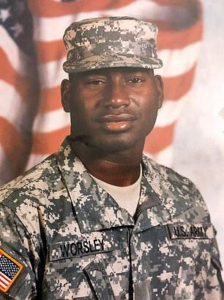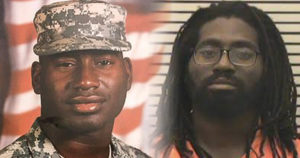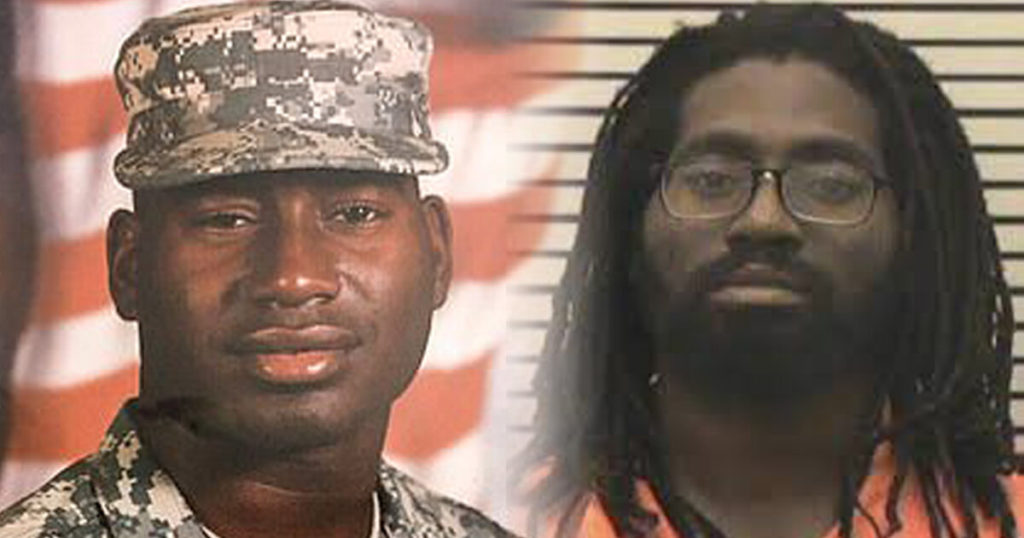
Sean Worsley and his wife Eboni were arrested in 2016, pumping gas off Highway 82 in Gordo, Alabama on their way to North Carolina.

Sean is an Army veteran of the Iraq War, where he was wounded in an improvised explosive device (IED) strike that resulted in a traumatic brain injury (TBI) and the development of post-traumatic stress disorder (PTSD).
In recognition of what he gave in service to the country, he was awarded the nation’s oldest military honor: the Purple Heart.
After his service, Sean sought medical care at the Department of Veterans Affairs (VA). The VA evaluated and rated Sean as 100% disabled and named his wife Eboni as his caretaker. Nearly driven to an early end by complications from his legally prescribed pharmaceutical cocktails of opioids, sedatives, and stimulants, Sean looked for an alternative.
Like the more than 20% of veterans who self-report using cannabis to treat their service-connected injuries, Sean found relief in a plant that was absent in the dozens of pills he was told to swallow a day.
Sean was traveling with his medical cannabis when a local police officer approached him because he was “playing music too loud.” Sean agreed to let the officer search his vehicle, not realizing that Alabama would not recognize his status as a medical cannabis patient.
Sean and Eboni were arrested on several charges, and a year later, Sean was sentenced to probation.
Due in part to the differences between Alabama and Arizona’s view of cannabis, he was unable to comply with the terms of his probation. In 2020, his probation was revoked and he was sentenced to five years in Alabama’s prisons.
About six years before Sean’s arrest in Gordo, just up the highway in a one-stoplight town called Reform, a veteran–my mother–died of complications from alcohol.
Joyce, or Mickey as she preferred to be called, had enlisted in the Women’s Army Corps, alongside her two sisters and a former Marine brother. They were children of a retired Navy chief petty officer who had served in three wars and returned home to Alabama to raise a family and work in the coal mines of his youth.
He died young—the booze, tobacco, and coal dust all likely contributed. Mickey, like millions of Americans, had struggles with mental and physical health that were made worse by stigma, alcohol, and pharmaceuticals.
She had post-traumatic stress disorder and anxiety stemming from her time as a police dispatcher and the murder of a friend in the bombing of a reproductive health clinic in Birmingham, committed by domestic terrorist and Olympic Park bomber Eric Rudolph.
My mother lived in one of the few “dry” counties in the nation that banned the sale of alcohol. So she and my step-father, a Vietnam War veteran and Marine with three Purple Hearts would drive down Highway 82 to the travel plaza just past the county line for beer or further to Tuscaloosa to buy hard liquor at the state-sanctioned Alcoholic Beverage Control store.
Both were also prescribed a range of often toxic and addictive drugs, including anti-psychotics, antidepressants, and non-steroidal anti-inflammatory drugs (NSAIDs). My mother and step-father, who passed less than a year later, lived in a world where alcohol was normalized and celebrated, where pharmaceuticals were prescribed off-label and with minimal evidence, and where our ongoing public mental health crisis was ignored.
They “played by the rules” in the drugs they consumed.
The lack of an effective means to manage their trauma and the easy access to destructive and legal substances was a driver in their early deaths.

Sean Worsley exercised perhaps the most fundamental human right of all in choosing cannabis—the right to self-care. He knew nearly two dozen veterans every day died by suicide—an estimated 100,000 since 9/11, along with an unknown number by overdose. He refused to become a statistic and he was punished for it by a state that profits off the sale of immensely more harmful drugs, just as it profits off his incarceration.
That’s quite some catch, that catch-22. It is the same catch that has entrapped millions of Americans—disproportionately Black, Indigenous, and people of color—and driven mass incarceration and community divestment in favor of policing and prisons. It is the same catch that has driven 80 years of increasingly authoritarian and militarized state responses that have resulted in untold numbers of the people arrested, imprisoned, bankrupted, and killed.
It is the same catch that allows a tiny few to become immensely wealthy selling certain drugs with no benefits and immense harms, who then use that wealth to buy political and judicial protection to shield them from accountability and crush competition.
It the same catch that sees one veteran jailed and two veterans in early graves, miles from each other, because they sought some peace from the nightmares, the years of insomnia, and the pain.
The society that claims to hold them in such high regard is the same one ready to strip their freedom or abandon them, just as it does for so many others who do not receive even token respect.
The truth of U.S. commitment to certain principles like respecting individual liberty or taking care of those it sends to war is written on the gravestones and prisoner identifications of people like Sean and my mother.
It is just one of many ideals we fall short of—but we all make a choice, each day, whether to continue to work toward that ideal. We show who we are by the impact we make in the world around us.
Sean deserves better.
My mother, my step-father, the servicemembers I’ve known killed in combat or dead by suicide and overdose—they all deserve better.
But we must identify the poisoned root of racism, militarism, and greed that sustains institutions like drug criminalization, rip it out, and repair the damage.
Let us act today to bring us closer to that reality.
You can help Sean Worsley by signing our community letter HERE
Or donating toward Sean’s legal fees, managed by his wife Eboni HERE
Beard Bros. Media contributor Eric Goepel is a U.S. Army veteran of the Iraq War and the founder of the Veterans Cannabis Coalition

















